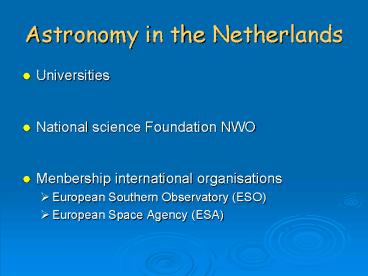Astronomy in the Netherlands - PowerPoint PPT Presentation
1 / 29
Title:
Astronomy in the Netherlands
Description:
Training of young astronomers at highest international level ... the mid-infrared spectrograph. LOFAR. Low-frequency radio observatory. Netherlands initiative ... – PowerPoint PPT presentation
Number of Views:50
Avg rating:3.0/5.0
Title: Astronomy in the Netherlands
1
Astronomy in the Netherlands
- Universities
- National science Foundation NWO
- Menbership international organisations
- European Southern Observatory (ESO)
- European Space Agency (ESA)
2
National Science Foundation NWO
- Grants
- Research Institutes
- ASTRON
- SRON
- Facilities
- WSRT
- JCMT
- ING
- JIVE
3
NOVA
- Netherlands Researchschool For Astronomy
- Federation vof university astronomical institutes
- Amsterdam, Groningen, Leiden, Nijmegen, Utrecht
- Mission
- Performing astronomical research in Nedtherlands
- Training of young astronomers at highest
international level - Long-term strategic program
- Title Unravelling the History of the Universe
. The Life-Cycle of
Stars and Galaxies - Three related fundamental research areas
4
Formation and evolution of galaxies
- Merging of smaller systems?
- Role of dark matter?
- Role of dark energy?
Velocity of is finite ? Distant
Long ago
5
(No Transcript)
6
How do stars and planets form?
- Is planet formation frequent?
- Life elswhere in the universe?
?
Orion Nebula
7
Outflows from young stars
HH211 PdBI
Current mm-wave arrays can only image large scale
structures, ALMA can study the jet/wind
on solar system size scales.
HST
x10
x10
8
How do stars form?
outflow
x1000 in scale
infall
Cloud collapse
Rotating disk
Planet formation
Mature solar system
Scenario largely from indirect tracers.
Fig. by McCaughrean
9
Late stages of massive stars
- How do black holes and neutronstars form?
- Physics under extreme densities and pressure?
- How do supernovae and gamma-ray bursts form?
- Recycling of matter left over by dying stars?
Cas A in X-rays
10
(No Transcript)
11
NWO participation in Observatories
Optical and infrared
Submillimeter
JCMT 15m
Mauna Kea, Hawaii
Roque de los Muchachos, La Palma
Westerbork Synthese Radio Telescope
12
Very Large Telescope and Interferometer
European Southern Observatory, Cerro Paranal
13
(No Transcript)
14
(No Transcript)
15
Hubble Space Telescope
16
Astronomy
- Extending our knowledge driven by oservations
- Measurements over the full electromagnetic
spectrum - Technology now offers possibilities to
- See galaxies over 93 of the age of the
universe - Detection of planets around other stars
17
NOVA strategy
- Optimise access to world-class observatories on
Earth and in space, and develop avanced software
tools for data analys
Best way to reach this goal is to build new
observing instruments
Small investerment ? large returns
18
National Program
- Research and Instrumentation
- Focus on three fundamental themes
- Wide cultural interest
- Approved for 10 years, start in 1999
- Total financing 35.2 M from minister of
research - This is 10 of national expenditure in astronomy
19
Instruments for ESO
- Very Large Telescope SINFONI
- VLT Survey Telescope OmegaCam
- VLT Interferometer Mid-infrared Instrument
- ALMA mixers/receivers (Band 9, 650 GHz)
VLT Survey Telescope
SINFONI
ALMA Band 9
MIDI
20
The most distant galaxies
- Hubble Deep Field-South
- Very Large Telescope
- 100 hours observing
- Reddest objects
- Birth of galaxies in young universe
- Light travel time 11 billion years
- Important component of young universe
FIRES Franx, Labbé, et al., 2002
21
Anatomy of a binary proto-star
Double proto-star Only 10000 yr old Physics
first phase of formationing
Cold dust and ice
2000 AU
Extended cloud cold dust
Schoier, Jorgensen et al. 2002 Cazaux et al. 2003
Complex organic molecules
22
Gamma-ray bursts supernovae
- Gamma-ray bursts
- Origin for long time mystery
- Very energetic explosions
- Recent VLT measurements
- Relation to supernova explosions
Amsterdam-led gamma-ray burst consortium, 2003
23
National strategy 2001-2010
- More young researchers at universities
- Strengthen long-term technical RD at ASTRON en
SRON for future instruments - ASTRON radio, optical/infrared
- SRON X-ray, interferometry in space
- Top priorities (2001-2010)
- Participation in ALMA
- Participation in 2e generation ESO VLT-VLTI
instruments - Participation in MIRI for JWST
- LOFAR, SKA
- Joint Institute for VLBI in Europe
24
Atacama Large Millimeter Array
Llano Chajnantor (5000 m)
25
(No Transcript)
26
James Webb Space Telescope
- 6m infrared telescope
- 3 instruments (1-28 µm)
- NASA ESA
- Launch 2011 with Ariane 5
- 1.5 million km from Earth
- Dutch consortium builds
- the mid-infrared spectrograph
27
LOFAR
- Low-frequency radio observatory
- Netherlands initiative
- Now international consortium
- ASTRON leads NL activities,
- Location in Drenthe
- Financing accomplished
- Operational in 2008
28
(No Transcript)
29
(No Transcript)































